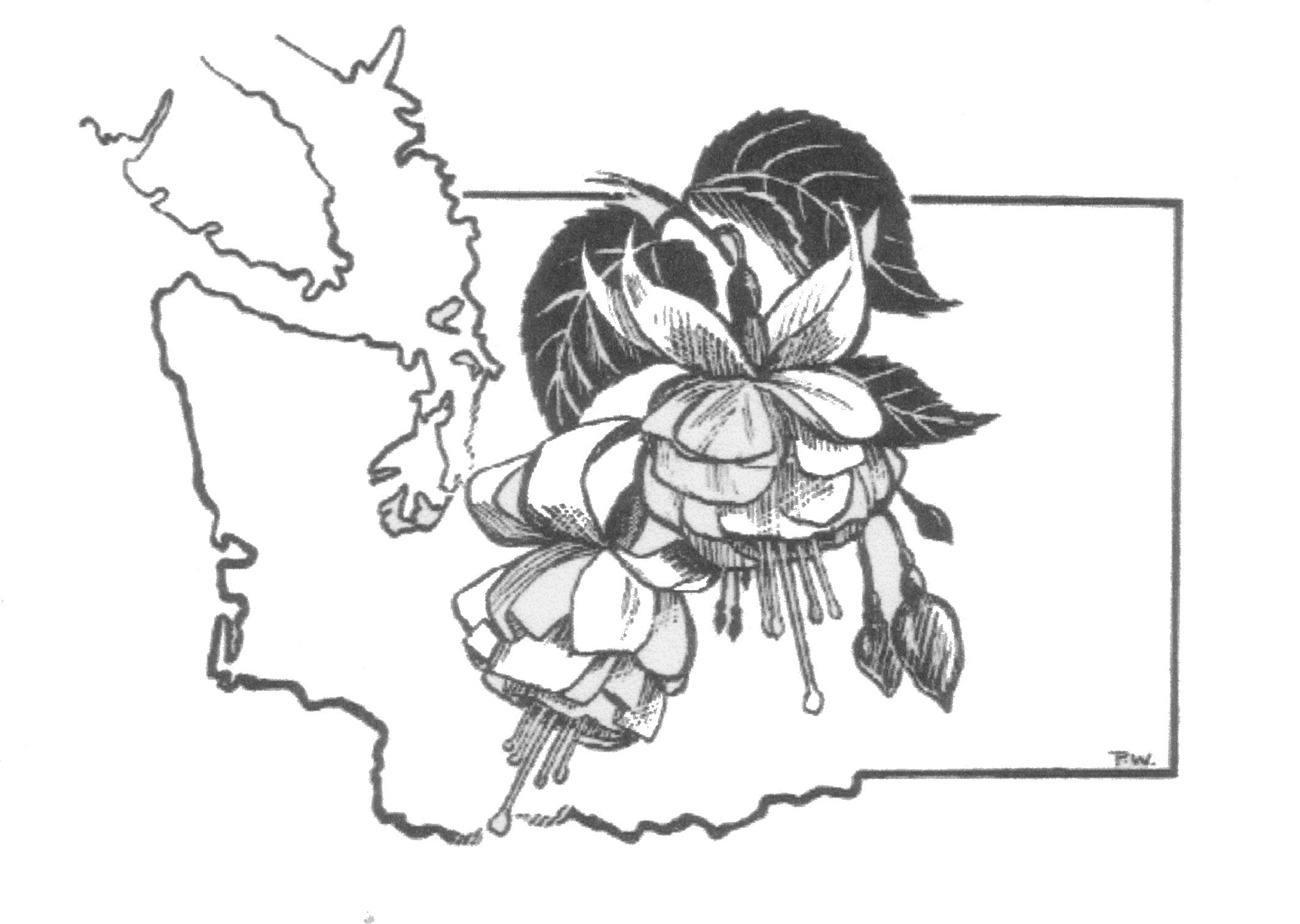The life-cycle of
Aculops fuchsiae is 2-4 weeks with four stages: egg, larva, nymph, adult.
The females lay ~50 eggs at one time, and in 1-2 weeks, they hatch. (If
even half of those 50 eggs produce baby mites , in no time at all, there are hundreds!)
The wee mites are expert at hiding in plant structures to avoid danger, and
controlling them is difficult but not impossible.
Dispersal
of fuchsia gall mites is done by the wind, insects, birds and especially
by gardeners handling an infected plant and moving on to another-- with
the mites hitchhiking on hands, clothes, hair…
PREVENTION
& CONTROLS
BIOLOGICAL CONTROLS:
Aculops fuchsiae
has predators, some believed to have been helpful in California, but these
predators cannot get to all of these elusive, wee fuchsia mites. Control
potential here is limited.
CLIMATIC CONTROLS:
With 7 nights of temperatures in the
teens and low 20's in the winter of 2006, the climatic control potential in
Western Washington and Oregon has become better known. Even 3-4 nights of
low temps seems to kill the mites. Presumably, the NWFS has found a minimum range of
temperature or perhaps it is the length of the freeze under which gall mites cannot survive. We now know that
infestations in gardens with fuchsias that are outdoors all winter is a ‘warm winter’
problem. On HARDIES in the PNW, freezes, when in the teens and low 20's
for 3-4 nights, perhaps less, kill the mites.
CONTROL BY FUCHSIA
GROWERS: How fuchsia growers raise
their fuchsias has an enormous effect on spreading fuchsia mite. Advice
from the American Fuchsia Society (AFS) based in San Francisco, suggests 3
approaches:
1. Destroy fuchsia mite infected plants.
New starts are inexpensive. They should be purchased from fuchsia specialists
who are aware of the problem and have a program to avoid it. ASK!
If they can't or won't tell you, go elsewhere.
Then consider…
2. Grow hardies outdoors, all year in
the PNW. Let freezes control the mites.
3. Raise Gall Mite Resistant and Immune fuchsias.
Some fuchsias show ugly galls, but not all. Brazilian fuchsias,
where the mite originated, have developed resistance to the damage. Mites may be
present, but damage is minor. Several species are resistant to the damage and pass that trait
on to their offspring. Some fuchsias are even immune to damage. Hybridizers in
California are raising new cultivars specifically for their gall mite, damage
resistance. They are appearing in PNW fuchsia nurseries.
4. If mite damage appears and destroying the plant is not an option
: Prune
out the damaged area in the plant parts.
Use chemical controls- choices listed below.
plants healthy.
In general, establish a program to keep
plants healthy; stick to it so that you
don’t spread mites to neighbors and re-infect your own plants.
Do not
work on an infected plant and then go to one not infected.
YOU will
just
spread the mite.
In
handling infected plant material, wear disposable gloves, burn the plant
material or place it in a plastic bag, tie it up snuggly, and put it and the gloves
in the garbage.
Do
NOT compost or recycle it.
Shower and change your clothes
before you work on clean plants—don’t let
the mites hitchhike
on you.
Disinfect tools and containers.
If possible, isolate infected plants
and keep animals away; they could also carry
mites to other fuchsias.
CHEMICAL CONTROLS:
IMPORTANT-
Whatever chemical controls you use…
1. Choose products
specified for
Aculops fuchsiae/fuchsia gall mite or eriophyid mites & safe for fuchsias or ornamental plants. Notice
whether it’s an indoor or outdoor product.
Names of pesticides can be similar and
confusing. Read the label !
2. Read the directions carefully and
follow them so that plants are not re-infected.
3. Read and follow the safety
precautions. Some products are toxic to humans and other animals.
CONTACT SPRAYS- Partial/Temporary Control
After pruning and cleaning up infested plants,
contact sprays can help control mites. Saturate the plant because light
applications will build immunity. With contact sprays you want to get the new
hatchlings, so remembering the life cycle, three applications,
7-10 days apart are needed- or as directed for fuchsia mite on the
product. Some will recommend 4 days apart.
Contact sprays include horticultural oils and
soaps which smother the mites (as well as other pests) like Safer Oil & Ultra
Fine Oil (by Sunspray), Volck Oil (by Chevron), Hot Pepper Wax…
To be most effective, use with a ‘spreader
sticker’.
Control potential is limited with contact
sprays; plants may get re-infected.
If you have had serious gall mite damage and/or
have many fuchsias, you may choose stronger products with active ingredients
that kill fuchsia mites. They have a much higher control potential, are
relatively safe when correctly used and are longer lasting.
For example- Sevin in 2012 has an active ingredient called carbaryl that kills eriophyid
mites. However, it is a hazard to bees and aquatic life. Keep away from
standing water; remove any blossoms that may attract bees. Spray outdoors and
let dry if bringing back indoors.) NOTE: a product listed as
effective on "mites" refers to spider mites and not to eriophyid mites.
Look for key words: miticide, acaricide--eriophyid mites
SYSTEMICS- The Most Effective Control
Most effective are products with
systemic qualities, but again, there are hazards to consider.
Commercial nurseries have access to products
not available to the public. "Avid" brand is one that is effective on
fuchsia mite but leave these treatments up to the professional grower.
SOURCES:
Dr. Carlton Koehler, et al, entomologist,
Urban Pest Management, U. of California, AFS Bulletin, Aug.,
1985.
AFS Bulletins-
1982-2005;
American Fuchsia Society-
www.americanfuchsiasociety.org;
European Plant Protection Org.-
www.eppo.org;
Texas A & M Extension Service-
www.tamu.edu;
Bayer, Ortho, Sunspray & Sevin product labels.
NWFS Gall Mite Committee-
Salli Dahl,
dahlhaus@myhome.net; Frankie Dennison,
rldmfd@earthlink.net; Ron Herzog,
ronh@americanrooftop.com ; Gwen Jensen,
gjensen11@juno.com;
Update- 2012
